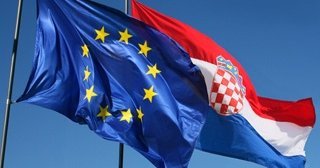However, few people suspected that the accession talks would last this long when Croatia applied for the EU membership in 2003. After applying for membership, Croatia became a candidate country in 2004 and the accession negotiations started in October 2005 only after the country had arrested and extradited General Ante Gotovina, who was wanted by the International Criminal Tribunal for the Former Yugoslavia (ICTY) on war crimes charges and thus proved that it was prepared to cooperate fully with the Tribunal in The Hague.
In addition, the accession talks were stalled on several occasions: first a land ownership dispute with Italy which dragged on until mid-2006 when an agreement was reached and then a long-standing border dispute with Slovenia stalled talks for more than a year. A procedure for resolving the dispute was agreed in June 2010, which meant that final negotiations on the EU membership could resume. Finally, the talks successfully ended on 30 June 2011 and the accession treaty was signed on 9 December 2011.
Corruption Remains Country’s Biggest Problem Furthermore, Croatia also had to prove that it was successfully fighting corruption. The EU strengthened the conditions and was intensely “tough teacher” as it learned its lesson earlier particularly with Bulgaria and Romania. Croatia stepped up its fight against corruption, especially at top levels, from mid-2009 when former Head of Government Jadranka Kosor took over as prime minister from Ivo Sanader who ultimately ended up being charged for abuse of power, war profiteering and taking bribes. In addition, following Sanader’s departure from office, a dozen managers of banks and state companies have been arrested for corruption but in most cases indictments are still pending.
Croatia not ready for Referendum? Now when Croatia finished its accession talks, the government and other political forces will have to convince their citizens that it is worth becoming the EU member, something that is definitely not an easy task. However, the Croatian parliament on 23 December decided to hold a referendum on 22 January. This was the first major decision by Croatia’s new parliament, dominated by the centre-left coalition, a day after its inauguration following December 4 general parliamentary elections.
Meanwhile, many experts and non-governmental organization GONG, which monitors electoral processes, voiced concern over the early date for the referendum and called for its “reasonable postponement.” Non-governmental organization GONG warned that the legal framework surrounding Croatia’s first referendum since independence has some weaknesses which could compromise its validity. In addition it said voters could not reach an “informed and mature decision” about whether or not to join the EU and the consequences of such a vote because they lacked information.
However, Tamara Puhovski, EU corner project manager at non-governmental organization Forum for Freedom in Education does not concur. She commented: “Although there is constant criticism of the lack of quantity and quality of information, it is not the information that is the problem, but rather it is the relationship between the government and those who are governed as there is no trust and no dialogue and that could be the downfall of the referendum. In other words, this is the first referendum in twenty years and the first opportunity to tell “all of them” how displeased the citizens are. However, whether the elections and the shift from central right to central left government succeeded in satisfying this urge or whether the referendum will pay the price remains to be seen. All the necessary information is online., maybe too much of it, because , in the age of information it is the context and the connections, the concepts and interpretations that matter (as is evident in the boom of “blogs” not the scattered pieces of information that are in abundance. This is why the answer is not informing the public) - it is, the long forgotten issue of educating and teaching, providing concepts, making connections and fostering critical thinking. This is why it would be pointless to have a referendum later, unless its a generation later, because that just might be how long it takes to make these kinds of qualitative and not quantitative changes.”
Stable Majority to Vote in Favor of Accession According to the latest polls conducted by CRO Demoskop earlier this month, 45.9 percent of the surveyed citizens who would go to the referendum would vote “yes”, while 11.9 percent would probably vote “yes”. Among the surveyed citizens who would go to the referendum, 31.2 percent would be against the EU membership. Nonetheless, majority of the citizens who will not go to the polls opposes Croatia’s EU membership – 43.3 percent.

Follow the comments: |
|
